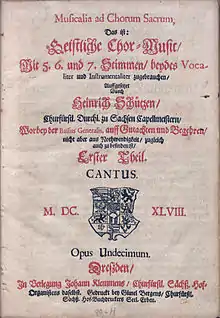Geistliche Chormusik
Geistliche Chormusik (Sacred choral music) is a collection of motets on German texts for choir by Heinrich Schütz. It was printed in Dresden in 1648 as his Opus Undecimum (Op. 11), and comprises 29 individual settings for five to seven voices, which were assigned numbers 369 to 397 in the Schütz-Werke-Verzeichnis (SWV). The original title was Geistliche Chor-Music, Erster Theil which indicates that Schütz planned a second part. It is also known as Geistliche Chor-Music 1648. The collection contains earlier and new works and a German arrangement of a motet by Andrea Gabrieli.
| Geistliche Chormusik | |
|---|---|
| by Heinrich Schütz | |
 Title page of Geistliche Chor-Music, 1648 | |
| Catalogue | SWV 369 to 397 |
| Opus | 11 |
| Genre | Collections of motets |
| Text |
|
| Language | German |
| Dedication | Leipzig, its mayor, council and Thomanerchor |
| Published | 21 April 1648 in Dresden |
| Vocal | 5 to 7 voices |

History
Schütz assembled a collection of 29 motets, which were assigned numbers 369 to 397 in the SWV, in 1648, the year that ended the Thirty Years' War.[1] The original title was Geistliche Chor-Music, Erster Theil which indicates that Schütz planned at least a second part. The collection contains earlier and new works and a German arrangement of a motet by Andrea Gabrieli.[1]
In an extended foreword, Schütz describes the work as examples of composition in counterpoint without basso continuo, following the model of his teacher Giovanni Gabrieli in stile antico, writing: Geistliche Chor-Music / Mit 5. 6. und 7. Stimmen / beydes Vocaliter und Instrumentaliter zugebrauchen / Auffgesetzet / Durch / Heinrich Schützen / ... Worbey der Bassus Generalis auff Gutachten und Begehren / nicht aber aus Nothwendigkeit / zugleich auch zu befinden ist ... (sacred choir music / with 5 6 and 7 voices / to be used both vocally and instrumentally / set / by / Heinrich Schützen / ... the general bass can be used at the same time if liked and wanted / but is not necessary).[1]
Schütz dedicated the collection to Leipzig, addressing the mayor and the town council and mentioning especially the choir, known now as the Thomanerchor. The dedication, dated "Dreßden, am 21. April 1648", is his first not to court and nobility.[1]
Collection
Schütz set mostly biblical texts, but also a few hymns. It contains "pleas for peace" such as "Verleih uns Frieden genädiglich" (Bestow peace upon us mercifully), which "react to the events of the day with more or less timeless, traditional texts".[2] The first twelve motets are settings for five parts, the others for six or seven parts.[3]
Translations are provided by Emmanuel Music, while the column "Source" offers the text of the King James Version of the Bible.[4]
| No. | SWV | Title | English | Source (and notes) |
|---|---|---|---|---|
| 1 | SWV 369 | Es wird das Scepter von Juda nicht entwendet werden | The scepter shall not pass from Judah | Genesis 49:10-11 |
| 2 | SWV 370 | Er wird sein Kleid in Wein waschen | He will wash his garment in wine | Genesis 49:12 |
| 3 | SWV 371 | Es ist erschienen die heilsame Gnade Gottes allen Menschen | The grace of God that bringeth salvation hath appeared to all men | Titus 2:11-14 |
| 4 | SWV 372 | Verleih uns Frieden genädiglich | Grant us peace graciously | by Martin Luther and Johann Walter |
| 5 | SWV 373 | Gib unsern Fürsten und aller Obrigkeit | Give our rulers and all lawgivers | continued |
| 6 | SWV 374 | Unser keiner lebet ihm selber | For none of us liveth to himself | Romans 14:7-8 |
| 7 | SWV 375 | Viel werden kommen von Morgen und von Abend | Many shall come from the east and west | Matthew 8:11-12 |
| 8 | SWV 376 | Sammelt zuvor das Unkraut | First of all collect the chaff | Matthew 13:30 |
| 9 | SWV 377 | Herr, auf dich traue ich | Lord, I trust in You | Psalms 31:1-2 |
| 10 | SWV 378 | Die mit Tränen säen werden mit Freuden ernten | They who sow with tears will reap with joy | Psalms 126:5-6 |
| 11 | SWV 379 | So fahr ich hin zu Jesu Christ | Thus I journey to Jesus Christ | Anonymous |
| 12 | SWV 380 | Also hat Gott die Welt geliebt | For God so loved the world | John 3:16 |
| 13 | SWV 381 | O lieber Herre Gott | O dear Lord God | Advent hymn |
| 14 | SWV 382 | Tröstet, tröstet mein Volk | Comfort ye, comfort ye my people | Isaiah 40:1-5 |
| 15 | SWV 383 | Ich bin eine rufende Stimme | I am a voice crying | John 1:23,26-27 |
| 16 | SWV 384 | Ein Kind ist uns geboren | A child is born to us | Isaiah 9:6-7 |
| 17 | SWV 385 | Das Wort ward Fleisch | The Word was made flesh | John 1:14 |
| 18 | SWV 386 | Die Himmel erzählen die Ehre Gottes | The heavens describe the glory of God | Psalms 19:1-6 and doxology |
| 19 | SWV 387 | Herzlich lieb hab ich dich, o Herr | I love you tenderly, o Lord. | "Herzlich lieb hab ich dich, o Herr" |
| 20 | SWV 388 | Das ist je gewißlich wahr | This is a faithful saying | 1 Timothy 1:15-17 |
| 21 | SWV 389 | Ich bin ein rechter Weinstock | I am the true vine | John 15:1-2,5a,4 |
| 22 | SWV 390 | Unser Wandel ist im Himmel | For our pilgrimage is to heaven | Philippians 3:20-21 |
| 23 | SWV 391 | Selig sind die Toten | Blessed are the dead | Selig sind die Toten (Revelation 14:13) |
| 24 | SWV 392 | Was mein Gott will, das g'scheh allzeit | What my God wills always occurs | Albrecht von Brandenburg's "Was mein Gott will, das g'scheh allzeit" |
| 25 | SWV 393 | Ich weiß, daß mein Erlöser lebt | I know that my Redeemer lives | Job 19:25-27 |
| 26 | SWV 394 | Sehet an den Feigenbaum | Behold the fig-tree and every tree | Luke 21:29-31,33 |
| 27 | SWV 395 | Der Engel sprach zu den Hirten | The angel said to the shepherds: | Luke 2:10-11, Isaiah 9:6, arrangement of Andrea Gabrieli |
| 28 | SWV 396 | Auf dem Gebirge hat man ein Geschrei gehöret | Upon the peaks a cry is heard | Matthew 2:18 |
| 29 | SWV 397 | Du Schalksknecht | You wicked servant | Matthew 18:32-33 |
Publication and recording
Geistliche Chormusik was first published in Dresden by Johann Klemm. It was published by Breitkopf & Härtel as part of the first complete publication of the composer's works, edited by Philipp Spitta, begun in 1885. It was published by Bärenreiter as part of the new critical edition Neue Schütz-Ausgabe. The five-part motets (No. 1–12) appeared in 2003, the others in 2006.[3] The collection is part of the complete edition of the composer's works by Carus-Verlag, begun in 1992 as the Stuttgart Schütz Edition and planned to be completed by 2017. The edition uses the Heinrich-Schütz-Archiv of the Hochschule für Musik Dresden.[5] They were recorded, as part of the complete recordings of works by Schütz, in 2008 by the Dresdner Kammerchor and the Cappella Sagittariana, conducted by Hans-Christoph Rademann.[6]
The motets have been frequently recorded individually or in selections. As of 2014, nine complete recordings were performed, making it the most frequently recorded of the collections by Schütz. Rudolf Mauersberger conducted the Dresdner Kreuzchor in 1962–63.[7] Heinz Hennig conducted in 1981 to 1984 the Knabenchor Hannover with instruments, performing some motets with solo voices, others chorally, some with alternatives.[8] Gerhard Schmidt-Gaden led a recording with the Tölzer Knabenchor in 1998, followed by Martin Behrmann, Manfred Cordes, Wilhelm Ehmann,[7] Matteo Messori,[9] Craig Smith and Masaaki Suzuki, Hans-Christoph Rademann among others.[7]
References
- "Entstehung Geistliche Chormusik SWV 369 - 397" (in German). Heinrich-Schütz-Haus. Retrieved 8 July 2014.
- Steude, Wolfram (2002). "Heinrich Schütz and the Thirty Years' War". Research Centre "Westfälischer Friede", Westfälisches Landesmuseum für Kunst und Kulturgeschichte Münster. Retrieved 8 July 2014.
-
"Heinrich Schütz. Geistliche Chormusik". 65. JSTOR: 161–163. JSTOR 30163639.
{{cite journal}}: Cite journal requires|journal=(help) - "Motet & Liturgical Works Notes & Translations / Heinrich Schütz". Emmanuel Music. Retrieved 29 April 2014.
- "Heinrich Schütz – Stuttgart Schütz Edition". Carus-Verlag. Archived from the original on 14 July 2014. Retrieved 24 January 2014.
- "Heinrich Schütz: Geistliche Chor-Music 1648. Complete recording (Rademann)". Carus-Verlag. Archived from the original on 14 July 2014. Retrieved 9 July 2014.
- Weber, J. F. "Schütz Geistliche Chormusik • Hans-Christoph Rademann, cond; Dresden CCh; Cappella Sagittariana". Fanfare. Retrieved 11 July 2014.
- "Schütz: Geistliche Chormusik 1648 SWV369-397". medieval.org. Retrieved 11 July 2014.
- Veen, Johan van. "Heinrich Schütz (1585 – 1672) / Heinrich Schütz Edition". musicweb-international.com. Retrieved 11 July 2014.
External links
- Geistliche Chor-Music, Op.11: Scores at the International Music Score Library Project
- Heinrich Schütz: "Geistliche Chormusik" 1648 - alle Motetten Thüringer Komponisten und Bearbeiter (in German)
- Im Dienst des Wortes / Heinrich Schütz: Motetten aus der "Geistlichen Chormusik" op. 11 Südwestrundfunk (in German)